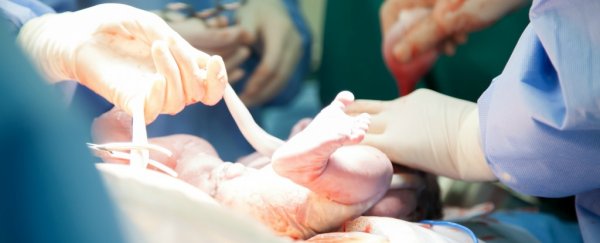Researchers have regenerated the memories and learning abilities of elderly mice by injecting their brains with proteins taken from human umbilical cord blood.
The blood of human teenagers had previously been shown to rejuvenate ageing mice, but this new study shows that blood from the umbilical cords of babies could have even more powerful effects.
Based on these findings, the researchers suggest properties in umbilical blood could one day be used to slow down neurological degeneration in elderly human brains, too.
But these results are yet to be replicated in humans, so we can't get too carried away.
"The really exciting thing about this study, and previous studies that have come before it, is that we've sort of tapped into previously unappreciated potential of our blood - our plasma - and what it can do for reversing the harmful effects of aging on the brain," lead researcher Joe Castellano from Stanford University School of Medicine told NPR.
In the latest study, the researchers collected blood from humans at three different ages: babies' umbilical cords; young people aged between 19 to 24 years old; and older people aged between 61 and 82.
The team then injected plasma taken from these blood samples into mice that were the equivalent of around 50 years old.
Impressively, the mice that received the plasma from umbilical cord blood started to perform better on behavioural tests than their peers, and their memories also improved - they were better at remembering the way out of a maze.
They also started building nests again, a skill old mice tend to lose.
On a cellular level, the researchers saw enhanced activity in the hippocampus - the part of the brain responsible for learning and memory, and one of the first regions to deteriorate in old age.
Similar but less impressive results were seen in the group of mice given the blood plasma of young adults (the 19-24 group), but there were no improvements seen in those treated with the blood of the older adults.
"Our findings reveal that human cord plasma contains plasticity-enhancing proteins of high translational value for targeting ageing- or disease-associated hippocampal dysfunction," the researchers write in Nature.
The study comes on the back of a series of recent publications that suggests that there's something rejuvenating in human blood that gradually declines as we age - and hints that we could one day use it to help stave off the effects of old age on our brains.
One new candidate for that anti-ageing secret ingredient is a protein called TIMP2, which the researchers found in unusually high levels in umbilical cord blood compared to blood from older people.
Previous studies using the blood of young mice had also found evidence that a protein called GDF11 could have similar restorative effects.
The problem now is that the researchers still aren't sure how either of these proteins work to stimulate anti-ageing effects.
"It's a bit of a black box experiment, because they don't know what's happening," Philip Landfield, a neuroscientist at the University of Kentucky in Lexington, who wasn't involved in the research, told Sara Reardon from Nature.
And other researchers are more skeptical - Rob Howard from the University College London, who also wasn't involved in this paper, told The Guardian that the lesson from Alzheimer's research so far is that "almost everything works in the animals, and so far nothing works in humans".
So we can't get too excited just yet. But we might not have to wait too long for answers, with the research in humans already underway.
Already, a clinical trial is being carried out at Stanford University to test the effects of the blood of under-30s on people with Alzheimer's. That trial is being led by Tony Wyss-Coray, one of the researchers who worked on this new paper.
And start-ups are also charging people ridiculous amounts to infuse them with the blood of young people, even though there's no evidence it actually works in humans as yet.
With all this interest, it's possible that in the next few years we'll get the first insight into whether young blood could help us stave off old age like it does in mice.
How we then turn that knowledge into a non-creepy treatment will be a whole other story.
The research has been published in Nature.
